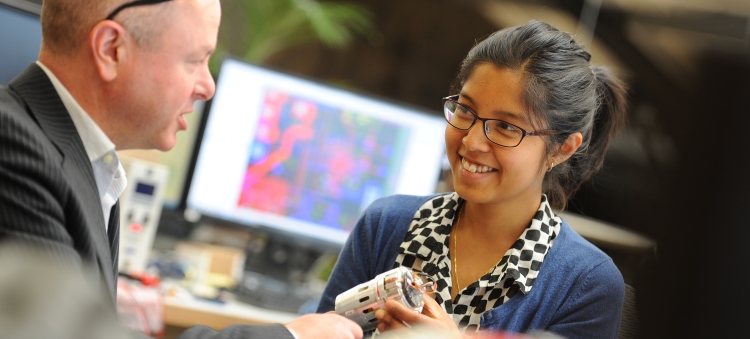I started at Cambridge Medical Robotics Ltd in September 2014 to join a team of engineers and scientists aiming to develop the next generation universal robotic system for minimal access surgery.
Within the field of keyhole surgery, most procedures are still done by manual laparoscopy where the operation is performed using manual instruments inserted in the body through small incisions with the aid of a camera. While robots do exist in this realm, they tend to be bulky, expensive and are not that intuitive to use. Inspired by the human arm, the lightweight robotic arm from Cambridge Medical Robotics is intended for use in a wide range of laparoscopic surgeries. It is also less expensive and takes up less than half of the space of existing systems. Ultimately, the aim of the system is to reduce complications and improve recovery times for patients while making it easier for surgeons to perform the procedures.
Joining a start-up at an early stage meant that as part of a small team, I was able to learn new skills while contributing to an ambitious project.
Over the course of the last 3 years, I have had the opportunity to design and build multiple joints of a robotic joint and be involved in the design of other parts of the surgical system. The fast-paced environment also makes it a very rewarding place to work at as every contribution is valued. My day-to-day work is incredibly varied ranging from mechanical design work to building robotic joints in the workshop. What I enjoy most is being able to work within a team of ambitious people who share the same drive to deliver medical devices that have the potential to make a big impact in the world of medicine.
As a mechanical engineer working in the field of surgical robotics, I have found myself collaborating within a multi-disciplinary team of mechanical, electronics, software engineers & scientists on a daily basis. Working within such a diverse team has required me to use my knowledge as a mechanical engineer but also what I had learnt from my first two years of general engineering at Cambridge.
When I started the general engineering degree at Cambridge, I was intending to become a civil engineer but I came out as a mechanical engineer seeking to work in medical devices. It took me by surprise when I realised that one short year after graduation, I was already directly involved in the development of devices that can genuinely impact the lives of millions of people.
Studying the sciences is the pathway to not only understanding how the world around us works but also to equip ourselves with the knowledge and skills to be able to influence the future we will live in. Becoming an engineer is the opportunity to participate in creating the future rather than being a spectator waiting for someone else to make it happen.
Nikki Phoolchund
Alumna
Cambridge Medical Robotics Limited: http://cmedrobotics.com/
